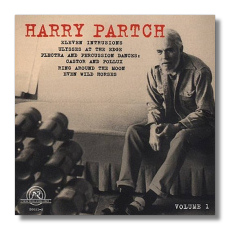
The Internet's Premier Classical Music Source
Related Links
- Latest Reviews
- More Reviews
-
By Composer
-
Collections
DVD & Blu-ray
Books
Concert Reviews
Articles/Interviews
Software
Audio
Search Amazon
Recommended Links
Site News
 CD Review
CD Review
Harry Partch

The Harry Partch Collection, Volume 1
- Eleven Intrusions
- Ulysses at the Edge
- Plectra and Percussion Dances: Castor and Pollux
- Ring Around the Moon
- Even Wild Horses
Harry Partch, percussion
Gate 5 Ensemble
Various performers
New World 80621-2 ADD monaural 75:49
Harry Partch (1901-1974) was one of the great innovators in classical music… or one of the great crackpots, depending on who you ask. As a young man during the Great Depression, he was a hobo, and the experience informed such works as Barstow (1941), which draws upon the graffiti of other rail-riders. Barstow is typical of Partch's early interest in "the intrinsic music of spoken words." Over time, but starting more or less around 1950, Partch became more interested in instrumental music. It was at this time that he divided the scale into 43 microtones – there are 12 semitone intervals in a traditional chromatic scale – and began inventing instruments that could play his new microtonal music. (This explains why his music is infrequently performed today – most of these instruments no longer survive. This disc includes "original recordings" made between 1950 and 1958 for small labels, and most recently released on the CRI label.)
The works on this CD were composed between 1949 and 1955, and show the composer quickly developing his new microtonal language. The Eleven Intrusions (1949-50) are transitional in their use of a spoken/sung ("intoning") text, idiosyncratically delivered by Partch himself. These works are less complex than those on the remainder of the CD. The Plectra and Percussion Dances are "Satyr-Play Music for Dance Theater," and were composed during 1952. Thematically, there's nothing that links Castor and Pollux, Ring Around the Moon, and Even Wild Horses except proximity. As is appropriate for music named for Jupiter and Leda's twin sons, the two halves of Castor and Pollux ("A Dance for the Twin Rhythms of Gemini") are precisely the same duration. Short phrases of irregular length are repeated and superimposed on each other in imitation, as it were, of the development of the twins within their respective swan's eggs. Ring Around the Moon is a "Dance Fantasm for Here and Now" in four connected parts or "phases." Partch biographer Bob Gilmore calls it "by any standards, one of the oddest compositions in Partch's output." The text – here intoned by the composer – is nonsense, but it is delivered with such seriousness and precision that one can't help but be impressed. Partch called it "a satire on the world of singers and singing, music and dance," but he also called it a satire "on music in 43 tones to the octave, on people who conceive such things," so it's pretty clear that his tongue was in his cheek. Even Wild Horses is "Dance Music for an Absent Drama," and it is a treatment of poet Arthur Rimbaud's exile in Africa, and also of "the individual's journey through life, which is conveyed as a purely instrumental drama, the instruments personifying ideas or forces relevant to the concept." This work hangs together less well than the other two components of Plectra and Percussion Dances, but it is good to have it documented here. The final selection on the CD is Ulysses at the Edge (1955), a "minor adventure in rhythm" which features an instrument called the "Boo," a bamboo marimba. The work ends with a joke; the words "Have you ever been arrested before?" had been spoken to Partch many times during his hobo years, and it amused him to think that they might have been spoken to Ulysses as he wandered incognito.
It was a labor of love to get these old 78-rpm and LP recordings onto CD, and New World was right not to let CRI's work fade away. The sound is not always as good as it could be, but it's surprising just how good it is. (Partch's later Columbia LPs still are in hot demand by audiophiles.) The performances all include Partch in way or another and must be considered definitive. The extensive annotations make this release even more worthwhile.
Copyright © 2005, Raymond Tuttle




















